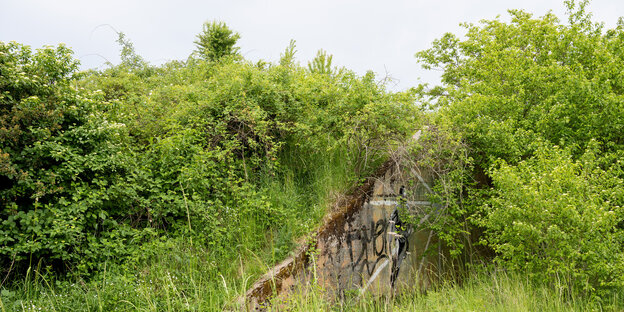Since the Russian invasion of Ukraine, defense policy has been realigned. The end of the era of conversion is in sight.

A former US military bunker in the Ober-Olm forest in Rheinhessen is overgrown with bushes Photo: Peter Zschunke/dpa
SEDAN taz | Where soldiers once lived, mothers and fathers now set the breakfast table. Where target shooting once took place, people walk through nature reserves. According to the Federal Real Estate Agency (Bima), the withdrawal of NATO troops from Germany freed up 400,000 hectares of land by 2020. According to research by the Karlshorst Museum (former German-Russian Museum in Berlin-Karlshorst), the Soviet armed forces occupied an area the size of the Saarland. Most of it has already been released for conversion.
The Bundeswehr has also been reducing its locations and areas for decades. Under the current parking concept, the closure of 31 locations and the drastic reduction of another 90 locations were announced. The reconversion of areas previously used for military purposes has been the order of the day in recent decades. Not only the land must be demilitarized. Since the end of the Cold War, German defense policy has been fundamentally realigned: conscription has been abolished, the defense budget has been cut, and the number of Bundeswehr troops has been reduced by more than half.
But Europe has been at war again for two years. In 2022, the German Chancellor announced the turning point. NATO's 2 percent target of each alliance country investing 2 percent of gross domestic product on defense would be met. 100 billion euros would go to the special funds of the Bundeswehr. In short: “Everything necessary will be done to ensure peace in Europe,” Olaf Scholz (SPD) said at the time, just three days after Russia invaded Ukraine.
A lot has happened since then. Defense Minister Boris Pistorius (SPD) wants Germany to be “in a state of war” again. He wants to transform his department and make it more efficient. To this end, for the first time the Bundeswehr will be permanently stationed in other European countries. By 2027 at the latest, 5,000 soldiers from a combat brigade in Lithuania are expected to protect NATO's eastern flank.
“Well-trained reserve”
Pistorius not only wants to increase troops in other EU countries. The Bundeswehr will increase to 203,000 soldiers. Currently there are almost 181,000. The Minister of Defense published new guidelines for his ministry in November. Among other things, he demands a “well-trained reserve” to provide reinforcements in case of national and alliance defense.
If the current trend of militarization continues, the Bundeswehr will eventually need room for expansion. The taz is not yet aware of any cases in which the federal government wants to reclaim areas that have already been converted. But a case in Gütersloh shows what is possible. The airfield in the city of North Rhine-Westphalia was used by the German Air Force during World War II. After the end of the war, the military airfield remained in the British occupation zone. Until 2018, the area was used by several British military units. When the British forces withdrew from Germany and the last helicopter took off, the site was handed over to Bima.
The airfield is now divided into two parts: Since 2017, the northern part belongs to the Gewerbepark Flugplatz Gütersloh GmbH, which is 70 percent owned by the city of Gütersloh. The southern part still belongs to Bima, which is responsible for converting the former military zones. The airport is also referred to as a “conversion area” on its website.
But that could soon change. As of 2023, the US Air Force has a request to allow the southern part of the airfield to be used again for military purposes. When asked by TAZ, neither Bima nor Gütersloh GmbH wanted to say to what extent the negotiations on the remilitarization of the airfield had progressed. However, the US Air Force's request gives an idea of the direction in which the conversion will take place in the future.